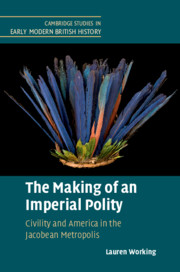The Making of an Imperial Polity
Bringing to life the interaction between America, its peoples, and metropolitan gentlemen in early seventeenth-century England, this book argues that colonization did not just operate on the peripheries of the political realm, and confronts the entangled histories of colonialism and domestic status and governance. The Jacobean era is reframed as a definitive moment in which the civil self-presentation of the elite increasingly became implicated in the imperial. The tastes and social lives of statesmen contributed to this shift in the English political gaze. At the same time, bringing English political civility in dialogue with Native American beliefs and practices speaks to inherent tensions in the state’s civilizing project and the pursuit of refinement through empire. This significant reassessment of Jacobean political culture reveals how colonizing America transformed English civility and demonstrates how metropolitan politics and social relations were uniquely shaped by territorial expansion beyond the British Isles. This title is also available as Open Access on Cambridge Core.
Lauren Working is Research Associate on the ERC-funded TIDE project (Travel, Transculturality, and Identity in England, 1550–1700) at the University of Oxford. She has held fellowships at the Jamestown archaeological site and the Royal Anthropological Institute, where she continues to develop methodologies and projects that explore indigeneity, colonial legacies, and heritage in English museums.

